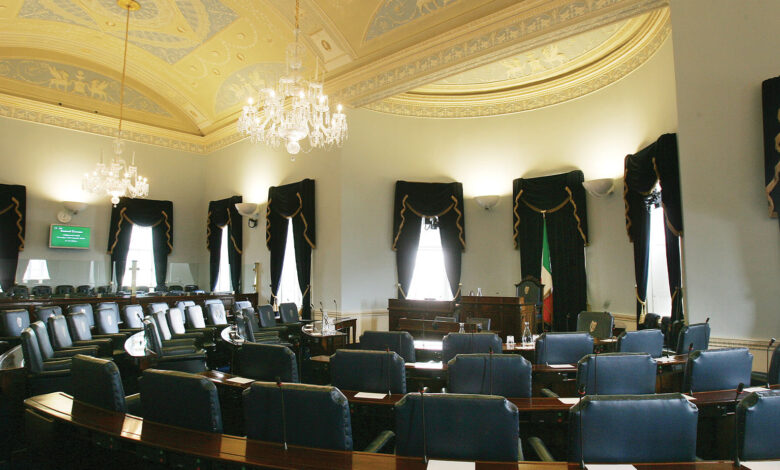Seanad voting rights extended to graduates

Voting rights for the six university seats in Seanad Éireann have been extended to graduates of all third-level institutions in the State.
President Michael D Higgins signed the Seanad Electoral (University Members) (Amendment) Act 2024 into law on the 29 October, 2024.
Initiated in September 2024 and sponsored by the Minister for Housing, Local Government and Heritage Darragh O’Brien TD, Act has three main elements:
1. an extensions of the franchise for the election of six seanadóirí;
2. the establishment of a single six-seat higher-education constituency; and
3. the appointment of the National University of Ireland as a central registration authority – led by a chief registration officer – to maintain a register of electors.
Since 1937, the six university seats have been elected by graduates of two universities: three from the University of Dublin (Trinity College Dublin) constituency and three from the National University of Ireland (NUI) constituency.
However, the new legislation provides for graduates of any designated institution of higher education in the State to be eligible electors in a new six-seat higher-education constituency, provided they are aged 18 or over and are Irish citizens. The Higher Education constituency will replace the existing NUI and Trinity College Dublin constituencies.
Under the revised electoral system, the NUI will be the Central Registration Authority (CRA), and will be responsible for maintaining the Register of Electors.
The CRA will also appoint a chief registration officer. There is provisions in the Act for a registration officer in each designated institution of higher education, who will be required to assist the CRO in the provision of information they hold so that an applicant’s claim can be verified.
Furthermore, the Act states that the first register of electors for the new higher-education constituency will be published on 1 April 2025, registering those eligible to vote on 23 January 2025. An annual register will subsequently be published each year on 1 June and register those eligible on the 26 February of the same year.
The passing of the Act comes following a Supreme Court judgement that sections 6 and 7 of the Seanad Electoral (University Members) Act 1937 – which provide for the election of seanadóirí by graduates of specific universities – are unconstitutional due to their inconsistence with Article 18.4.2O of the Constitution as amended.
The Court found that Article 18.4.2O of the Constitution which was amended through a referendum on the Seventh Amendment in 1979, Oireachtas to enact legislation to include the electors of other higher-education institutions beyond NUI or TCD.
In May 2023, the Supreme Court found that the framing of the proposed amendment of the Constitution in 1979 necessitated subsequent action to expand the franchise. However, until now, this legislation had not been meaningfully pursued.
The Supreme Court’s subsequent judgement means that the Oireachtas must remedy the unconstitutional provisions of the 1937 Seanad Electoral Act, requiring that the change is in place by the end of May 2025. This means that while the Act has been signed into law by President Higgins, it will still have no affect on the impending general election and it also means that the current Seanad Éireann will sit another term before any provisions within the Act are implemented.
Speaking on behalf of the Government, the Minister for Housing, Local Government and Heritage, Darragh O’Brien TD said: “This legislation will broaden the electorate for electing the Seanad’s six university seats to graduates from a range of higher education institutions through a significant expansion in the number of graduates eligible to register to vote.
“Amending existing legislation so that the franchise for electing these six senators to one vote per graduate will enshrine the principle of equality of representation in the higher-education constituency.”
Also welcoming the decision was the Minister of State with responsibility for Nature, Heritage and Electoral Reform, Malcolm Noonan TD, who stated that the new constituency should “help ensure different voices and ideas among our graduates are represented, keeping with the diversity of views the Seanad has long espoused”.
While the Act has been signed into law, the Government has received criticism from opposition parties and independents who have stated that the Government has only introduced reforms because of pressure from the Supreme Court.
Senator Rónán Mullen accused the Government of “taking a minimalist approach within a minimalist approach by seeking the way the university seanadóirí are elected”.
“I do not think it is a good idea in this day and age that graduates would have access to votes that citizens without degrees do not,” Mullen stated.
“There is all sorts of bogus modernisation going on around here, but if we were serious about modernisation it would be a good idea to adopt the principle that every citizen should have a vote for the Seanad. Anything else is a disgrace.”
During the Dáil’s final debate of the Act, Sinn Féin deputy whip Denise Mitchell TD, accused the Government of applying the Supreme Court’s judgement in its “narrowest form”.
“The legislation still excludes the majority of people from voting in the Seanad. The Government appears happy to continue to leave the Seanad open to ridicule and the accusation of being completely undemocratic,” Mitchell stated.
“Graduates from Queen’s University Belfast, Ulster University, St Mary’s University College Belfast, and other graduates from regional colleges across the North have all been left behind here.
“The Government has done the bare minimum [and] it has fumbled an opportunity for meaningful reform.”





